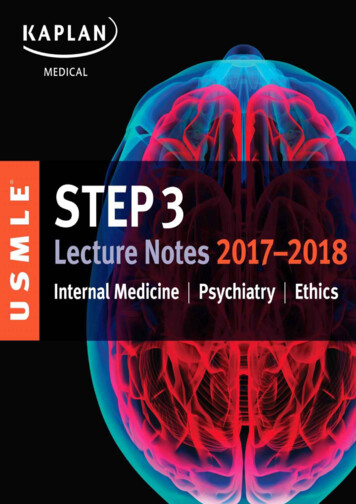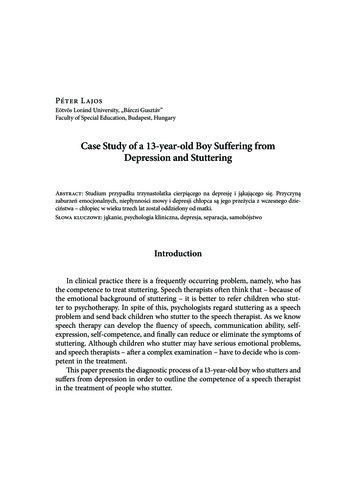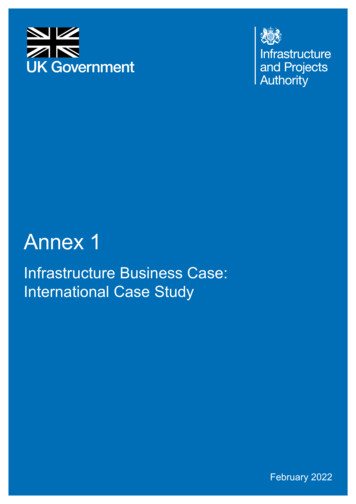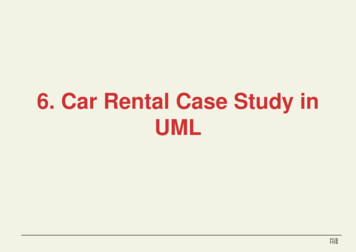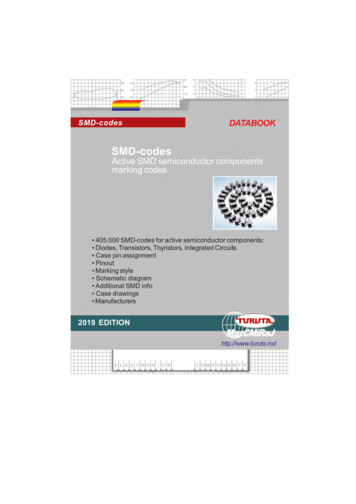
Transcription
A CASE STUDY ON THE CAUSES OF ETHNIC CONFLICTWITHIN NIGERIA.BYOGOCHUKWU MICHAEL OSAKWEAN INDEPENDENT STUDY SUBMITTED IN PARTIAL FULFILLMENT OFTHE REQUIREMENTS FOR THE DEGREE OF MASTER OF ARTSIN PEACE STUDIES AND DIPLOMACY, SIAM UNIVERSITY,BANGKOK, THAILAND2017
ABSTRACTEthnic conflict in Nigeria has led to the lack of peace and harmony. Nigeria is a complex countryin Africa with over 300 ethnic groups and 120 different languages spoken throughout the country. Theissue of discrimination, based on “We” and “Them.” negatively affect the socio-economic and politicaldevelopment of Nigeria. Since the day of independence, there has been the struggle for superiority andrecognition among the various ethnic groups that led to the Nigerian civil war from 1967-70.Colonization, the struggle for position and power, resource control, social class status and land disputehas been the causes of ethnic conflicts within Nigeria. The objectives of this study are to explain theroot causes of ethnic conflicts that lead to ethno–religious conflicts in Nigeria and to evaluate themagnitude of human and material resources destroyed as a result of such conflicts. A historical researchmethod was employed for gathering secondary data from sources such as books, newspapers,magazines, dictionaries, journals, government publications and online information. The result revealedthat the six geo-political zones of Nigeria namely; North West, North East, North Central, South West,South-South and South East zones have all witnessed all kinds of ethnic conflicts resulted from the sameset of causes. Based on the findings, it was recommended that Nigeria should stop the practice offederalism and embrace confederation, which will give the country and its people autonomy to rule andmanage their resources. The government should not be biased in sharing the wealth of the nation, oneethnic group, in particular, should not be favored against another.Keywords: Nigeria, Conflicts, Ethnic Conflicts, Peace
IACKNOWLEDGEMENTI would like to express my deepest appreciation to my advisor, a professor whodespite his busy schedule found time for this work. To whom, without your guidance,suggestion and analyses this report would not have been submitted: Assistant Professor Dr.Chaiyanant Panyasiri.To the director of MAPD, who persistently believed in me and overly eager toread what I would come up with in this research. For your encouragements and supports fromthe classrooms and to the end of this piece, thanks you Associate Professor Dr. TatreeNontasak.Furthermore, I would like to thank all the professors in the MAPD program andthe staff of Siam University for your supports in various ways.A big thank to my family, my loving mother: Mrs. Isioma Rita Osakwe, mywife: Esther Ujunwa Osakwe, my brother: Mr. Emeka Martins Osakwe, and to my friend: Mr.Nwaizu Obinna Dennis, without them this work would not have been possible.
IIDEDICATIONI dedicate this Research Study to God Almighty my creator, my strong pillar, mysource of inspiration, wisdom, knowledge and understanding. He has been the source of mystrength throughout this program and on His wings only have I soared.Glory be to his Name, Hosanna in the highest.
IIIDECLARATIONI, Mr. Ogochukwu Michael Osakwe, hereby declare that this independent study is the record ofauthentic work carried out by me. I may have discussed the paper with others and used adviceand suggestions from others in writing it, but the paper is my own original work and is neithercopied from another source without proper acknowledgement, nor written for me by anotherperson, in whole or in part, and has not been submitted to any other university or institution forthe award of any degree or diploma.Signature:Name:Ogochukwu Michael OsakweDate: .
IVABBREVIATIONAPCEBAArewaEgbesu Boys of AfricaFCTFederal Capital TerritoryHDIHuman Development IndexHDRHuman Development ReportINCIjaw National CongressIYCIjaw Youth CouncilLGALocal Governments’ AreasPeople’sMASSOBMovement for the Actualization of Sovereign state of BiafraNDDCNiger Delta Development CommissionNGONon-Governmental OrganizationOAUTHCCongress.Obafemi Awolowo University Teaching Hospitals ComplexONSOPADECOndo State Oil ProducingOPCOodua People’s CongressUCDPUppsala Conflict Data ProgramUNUnited NationsUSIPUnited States Institute of PeaceWHOWorld Health OrganizationAreaDevelopmentCommission
VTABLE OF larationIVAbbreviationsVTable of ContentsVIList of PicturesVIICHAPTER 11.1 Background11.2 Significance of the Problem91.3 Objective of the study111.4 Definition of terms12CHAPTER 22.1 Literature Review152.2 Types of Ethnic Conflicts in Nigeria182.3 Causes of ethnic conflicts in Nigeria212.4 Review of Related Research272.5 Conceptual Framework32CHAPTER 33.1 Research Methodology333.2 Research Design333.3 Data Collection343.4 Data Analysis Methods34CHAPTER 44.1Ethnic Conflicts Between the Northern and theSouthern in the North Part of Nigeria364.1.2 Ethnic Conflicts Between Ilaje and Ijaw Arogbo OverControl of Resource in the Southwest and South-South of Nigeria38
VI4.1.3Ethnic Conflicts Between Ile-Ife and ModakekeOver Social Class in the Southwest of Nigeria4.1.4Conflicts Between Ethnic Group and MultinationalCompanies in the South-South part of Nigeria4.1.54041Ethnic Conflicts between Aguleri and UmulerOver Land in the South East of Nigeria424.2Causes that Lead to the Conflicts474.3Discussion48CHAPTER 55.1Conclusion505.2Recommendation51References53
VIILIST OF PICTURESPicture No 1:Ethnic Map of Nigeria5Picture No 2:Nigerian Map showing Six Geopolitical Regions, Thirty-Six States and One FCT8Picture No 3:A Map shows territorial boundaries of West African countries17Picture No 4:Communal conflicts in Nigeria24Picture No 5:Nigeria: Muslims slaughter 400-500 Christians in latest Jos crisis44Picture No 6:Nine Times ethnic and religious crisis threatened the peace of Nigeria45Picture No 7:A Bloody Clash in Ile-Ife46
CHAPTER ONEINTRODUCTION1.1Background of the studyNigeria is a country in the continent of Africa, with over 300 ethnic groups and 120different languages spoken in the country. Nigeria has two major religious affiliationsChristianity and Islam, which are both the origin and history of ethnic conflict in the country. Theethnic groups have all seen themselves as a rival competing for power and decision making overeconomic resources. Today the country faces a more serious challenge to peace and stability as aresult of ethnic differences; this has led to insecurity, instability, poverty and corrupt politicalinstitutions in the country.According to Reuter (2015) International peace and security has been mainly threatenedby ethnic clashes. The clashes in Balkans, Rwanda, Chechnya, Iraq, Indonesia, Sri Lanka, India,and Darfur, as well as in Israel where the West Bank and the Gaza Strip, are the worst examplesof the late 20th and 21st centuries. Ethnic chaos is the widely known result of unstable province,states and most of the case, the whole region. These incidents are associated with ethnic clashes,multitude human right violations, genocide and crimes against humanity, all make the economicto fall to the lowest, state failure and refugee crises. Chaos in ethnic clashes often led to hugehuman hardship.1
Many African countries such as Democratic Republic of Congo, Rwanda, Uganda,Somalia, Sudan, Burundi and many more have experienced series of conflict, that occurredbetween communities, ethnic groups and religious groups and Nigeria is not excluded. Conflicthave been linked to ethnicity and this have led to serious loss of life and property in many areasof the country.The first years of Nigerian independence were characterized by severe conflicts withinand between regions (InfoPlease, 2012). Compounding the problem of underdevelopment in apoor country like Nigeria is ethno nationalism, access to resources and allocation of power posesa great threat to peace, security and progress of the nation. Nigeria has a long history of ethnicconflict in which development cannot take place.According to StudyMode Website (2013), the problem of Nigeria ethnicity and ethnicclashes has its roots from the history of colonialism, which forcefully brought the ethnic groupsof the northern and southern states to form the entity called Nigeria in the year 1914. In additionto the problem, StudyMode, (2013) stated that the case of Nigeria circumstance with past event ofcolonialism distress have brought into existence, hatred and clashes within different ethnicgroups.As the case may be, the country persists and remains polarized along ethnic divisions.Lack of trust and discrimination has frequently characterized the features relationship of all theethnic groups in the country, affecting unity, peace and stability of the country.2Nigeria has
witness series and countless of different ethnic crisis / violence such as the Igbo-Hausa crisis inKano, Hausa-Yoruba crisis in Lagos and Ogun States, Zagon-Kataf in Kaduna State, Jukun-Tiv inTaraba State, Birom-Hausa in Plateau State, among others, the civil war of 1967-1970 and manymore which have threatened the unity and well-being of Nigeria.Ife-Modakeke chaos is the ancient intra-ethnic clashes in Nigeria archive. Nigeriasouthwestern state Osun belongs to Yoruba tribe where both Ife and Modakeke are part of thesame tribe and state. These two communities of Ife and Modakeke are both descendants ofOduduwa, the ancestral father of the Yoruba people according to hereditary traditional story. Thetwo community’s lifestyle and governance operational way are greatly identical and theirsurrounding spreading greatly with one another. Ife and Modakeke are both relatives, but theyhave fought each other in a bitter struggle clashes for century (Akanle,2009).The circumstance continued to impact negatively on the forces of national integration andcohesion in ethnically divided Nigeria. A country that is troubled with series of ethnic difficultycan only face enormous loss of lives, destruction of property and refugee crisis, that frequentlyredirect the attention of government from the business of governance to crisis management. Toend ethnic conflict in Nigeria, an effort must be made to create and foster an enablingenvironment which result in peace, stability and assured the security and well-being of the peopleand the optimal use of human and natural resources to promote and improvement the quality andvalue of all citizens.3
According to AnswersAfrica (2013) Nigeria largest tribe is the Hausa, which makes up to29 % of the country population. The Hausas occupied the northern part of Nigeria, Niger Republicsouthern part and Chad Republic west end are also being occupied by the Hausas. The rural andurban areas in northern part of Nigeria consists of Kano, Kaduna, Jos, Katsina, Abuja, Sokoto,Bauchi, Birnin Kebbi, Damaturu, Gombe and Jos. Most often these two tribes in Nigeria, Hausaand Fulani, have the same identity in their tradition and lifestyle which makes them to be calledHausa-Fulani. One of the main tribes in Nigeria are the Igbos with measured amount of peopleinheriting their ancestry from the Igbo tribes. Past events show that the Igbo tribes were from Nrikingdom, one of the oldest kingdom in Nigeria.Culturally, Igbos are productive. During the Stone Age they produce bronze ceremonialvessels as way of their culture and heritage. The south-eastern part of Nigeria and some of themain cities such as; Enugu, Onitsha, Owerri, Asaba, Awka, Abakiliki, Abia, Orlu are habitableby the Igbo tribes. ( AnswersAfrica , 2013). Nigeria population of 21% is the Yoruba tribe and thisamount to 40 million people. The Yoruba tribes occupied the southwestern part of Nigeria andalso spread across some of the West African countries like Benin Republic, Ghana, Togo andsurprisingly the Caribbean. The Yoruba has ancient past event of poetry and arts in 1100 to 1700,which produce magnificent bronze statues which represent their goods and their rulers in headsform, they produce so much bead work, metalwork weaving and mask making as part ofartworks (AnswersAfrica , 2013).4
Picture No 1: - Ethnic Map of NigeriaSource: http://www.onlinenige ria.com/mapethnic.asp5
Regarding origin of the name of the country, Flora Shaw, a British journalist and a writer,created the name Nigeria. Shaw suggested the name Nigeria to the Times of London through amessage on January 8th of 1897. The name Nigeria was proposed to the British Protectoratealong the Niger River. Shaw research writing to be used for a short form "agglomeration of paganand Mahomedan States" which was operating under Royal Niger Company territories as anofficial name. The thinking of Royal Niger Company Territories as a term is too long for a nameof a Real Estate Property which was Shaw concern. She then looked for a name and called itNigeria, liking to such as Central Sudan" that were known with the area by some geographers andtravelers (Wikipedia, 2016).The 19th century saw the British manipulation over the most-biggest Africa nation calledNigeria.The year 1960, independence of Nigeria from the British were declared. After theSecond World War, many events constituted Nigerian the self-rule of their own nation. Nigeria,for more than 40 years, was governed by the military between the 1966-79 and 1983-98. It justbecame a constitution state in 1999 with some peaceful handover from civilian to civilian in thepast 16 years of democracy. Nigeria still have its ethnic and religious hostility up to date, with the2003 and 2007 election reported to be fraud and with chaos, at the moment the nation is seen asthe longest democracy form of government in the history of the country since its independence.6
The April 2007 election was noted to be the first transition of power from a civilian to acivilian in the history of the nation, while the 2011 election was recognized as free and fair.Nigeria in January 2014 gained a non-permanent seat in the UN security council for 2014-15 era(Online, 2014).Nowadays, the Federal Republic of Nigeria is made up with 36 states with 774 localgovernments’ areas (LGA) and 9,565 wards with the Federal Capital Territory located in Abuja(FCT). The nation is divided into six geopolitical zones such as; North Central - North West North East - South West - South East and South-South. The nation is still in chaos up to date, dueto the inefficient of the leaders to supply enough sociopolitical and economic stability to all theethnic groups. The living standard of Nigeria citizens is very poor and it has grown into anepidemic, such that almost 100 million are living below 1 per day, even though the nationeconomic has grown so much. According to the National Bureau of Statistic of 2010, 60.9% ofNigeria citizen still live definitely in hardship, which rose from 54.7% in 2004. (BBC, 2012).7
Picture No 2: - Nigerian Map showing Six Geopolitical Regions, Thirty-Six States and 90211693 fig2 ions-Thirty-Six-States-and-One-FCT8
1.2Significance of the ProblemAs mentioned in the background of the study, Nigeria is a complex country with over 300ethnic groups and 120 different languages spoken in the country. According to Nnenna (2014),Nigeria citizens are radical when it comes to ethnicity. This makes it easy for Nigerians to beannoyed when being referred to as another tribe which is not them. The problem of antisemitismhas destroyed the socioeconomic and political growth of the nation. Nigeria, as a country, beenrooted on "we" and "them" that has had a bad impact on the nation. This is not the real image offederal nation, diversification in ethnicity has been the sociological issues holding back theprogress of Nigeria as a nation. In addition to the issue, according to Nnenna, (2014); the entitycalled Nigeria is a forced marriage in which the people involved were not been asked if theywant to be one nation. The battle for supremacy has brought chaos among the ethnic groups sincethe independent of Nigeria, which also had led to civil war between 1967-70. This war wasfought between the Igbo tribes called Biafra and the Nigeria federal government, which was ledby General Yakubu Gowon and mainly populated by the Hausa’s.While every main ethnic groups in Nigeria have taken advantage against other groups,they have created militants for their own selfish purpose which are not legitimate. Because of theabsent of the law enforcement agencies, they formed some watchful groups that have done morechaos than good (PBS, 2007).9
Political supremacy and lack of availability of economic wealth is responsible for theepidemic of ethnic militant in Nigeria as a nation. These are ethnic groups militants and theirbase in the country, South West occupied by - the Oodua People’s Congress (OPC), South East the Actualization of the Sovereign State of Biafra (MASSOB), South-South - the Egbesu Boys ofAfrica (EBA), North (North West, North Central and North East) - the Arewa People's Congressetc. These affiliated groups are certainly made up of youths and they profess to represent ethnicgroups and their interest.In addition, disaster to the nation's socioeconomic progress goal also been caused by theethnic militant activities in Nigeria. Many ethnic groups want to fulfill their own interest at thecost of the nation, which happen to be the real truth about the circumstance of Nigeria. Thedisaster to the progress of Nigeria in aspect of politics of bitterness, culture of impunity, moraldecadence, hooliganism and many more are due to the events of militants groups in the nation.Investigating Nigeria as the giant of Africa, with over 300 ethnic groups overwhelmingvelocity of ethnic clashes is very interesting, the reason is that most main causes of the clashessuch as; politics, power, economic, culture and regional issues have been abandoned as causefactors to the Nigerian clashes, the research will center the main root of ethnic clashes in Nigeriaand how dangerous it will be in the future.10
The research will look on the effect that ethnic clashes have done to the socioeconomicand political progress of Nigeria, which will also look at all the most affected states that havesuffered from the ethnic clashes.This investigation job will be used as a fair root of character progress. The investigationwill identify the main source that is producing ethnic chaos in Nigeria, with important dataavailable for people. It will be used as recorded proof that widen the understanding of the ethnicleaders, followers and policy makers on the atrocity of ethnic clashes in Nigeria. A preferablepolicy formulation right from the local, state and national levels would enhance in correctingproblems relating to ethnic clashes in Nigeria. The anticipated benefits of this investigation arethat it will be used as a way towards the progress of a policy plan and notable force in peacefulco-existence among the practitioners of different ethnicity in Nigeria.Upon these mentioned rationale, the research study got my attention while I was movedon my last visit to Zaria, one of the major city in Kaduna State in northern Nigeria. I found outthat they were in some kind of disagreement with the next community. Less than a day they werekilling among the ethnic groups over the unresolved issue. I got interest to know more whycircumstances like this occur among the ethnic groups in Nigeria. I want to learn more on conflictissue and learn how to prevent and profound solution when needed in the future.1.3Objectives of the studyThis research aims to achieve the following objectives:11
1. To evaluate the magnitude of human and material resources destroyed as a result ofethnic conflict in Nigeria.2. To explain the roots causes of ethnic conflicts in Nigeria3. To recommend a comprehensive strategy for resolving ethnic conflict in Nigeria1.4Definition of termsConflictAccording to Wikipedia. (2016, 09 28), conflict refers to some form of friction,disagreement, or discord arising within a group when the beliefs or actions of one or moremembers of the group are either resisted by or unacceptable to one or more members of anothergroup.Conflict PreventionConflict Prevention in this paper refers to strategies, mechanisms used to avoid, reduce orcontrol potential violent conflicts, and to prevent violent conflict from re-occurring or happening.These mechanisms help to control potential violent conflicts or dispute from escalating intoviolence. Despite the development and effort of various government agencies and NGOs workingtogether to promote social justice, conflict resolution, good governance and participatorysustainable development, the number of violent conflicts has increase rather than decrease inNigeria.12
Conflict ResolutionIn this study, conflict resolution refers to the methods or process of attempting to findsolution to settle a dispute. In today Nigeria, very few people involved in conflict resolution aretrained to either prevent or settle disputes (Fatunde,2010). Fatunde further stated that theUniversity of Ibadan recently signed a memorandum of understanding with two governmentagencies to establish an Institute of Peace that will train people in this crucial field.In addition, three major events in the recent past have galvanized the government to seekthe creation of a peace institute: the crisis in Niger Delta, Nigeria's economic honey pot; theethnic-religious conflict in Plateau State, the country's tin producing region; and Nigeria'sinvolvement in the multi-ethnic conflict in Darfur, in south west Sudan.EthnicityEthnicity refers to shared cultural practices, perspectives, and distinctions that set apartone group of people from another. That is, ethnicity is a shared cultural heritage. The mostcommon characteristics distinguishing various ethnic groups are ancestry, a sense of history,language, religion, and forms of dress. Ethnic differences are not inherited; they are learned(Harcourt, 2016).Ethnic ConflictAccording to (Wikipedia, 2016) Ethnic conflict is a conflict between two or morecontending ethnic groups. While the source of the conflict may be political, social, or economic,the individuals in conflict must expressly fight for their ethnic group's position within society.13
National StabilityNational Stability refers to the common or characteristics of a whole nation in a state ofbeing stable or peacefully united.PeacePeace, is seen as harmony and tranquility with the absence of violence and freedom fromfear of violence. Peace in Nigeria is critical to regional stability. The government should be heldaccountable in ensuring peace and unity in Nigeria. The leader's must step-in to inform andeducate the public, mostly the uneducated citizens about the unity and peaceful living among theethnic groups, with the main theme of equality and oneness. This can be spread through all formof media to the massive population. Nigeria was built on the foundations of peace and unity. Theyshould support the Nigerian dream of unity in diversity and stay strong, peaceful, and uniteddespite the challenges ahead of them.Peace BuildingPeace Building in this study is the mechanisms designed to facilitate and ensure thatstability and peace is reinstated and prevent the recurrence of conflicts by promoting peacebuilding and reconciliation through social, political and economic transformation. Today, theunited states institute of peace (USIP) work jointly with the Inter-Faith Mediation Center topromote religious peace building and reduce conflict in the Niger Delta area by funding andfacilitating dialogue among the three ethnic groups locked in competition and conflict.14
CHAPTER TWOLITERATURE REVIEW2.1A Brief History of Modern NigeriaNigeria, gained independence on October 1st 1960 from the British and became arepublic on October 1, 1963. Nigeria is known as the "Giant of Africa" and the largest Africannation in the world. Nigeria is a country on the coast of West Africa, bordered by the Bight ofBenin and the Gulf of Guinea in south. Nigeria is bordered by Benin, Cameroon, Chad, andNiger. It shares maritime borders with Equatorial Guinea, Ghana, and São Tomé and Príncipe.With an area of 923,768 km² the country is almost four times the size of the UK or slightly morethan twice the size of the U.S. state California. Nigeria's main rivers are the Niger, where it got itsname from, and the Benue, the main tributary of the Niger. The country's highest point isChappal Waddi (or Gangirwal) with 2,419 m (7,936 ft.), located in the Adamawa mountains in theGashaka-Gumti National Park, Taraba State, on the border with Cameroon (Online, 2014).As of 2015, the estimated population of the country is over 182,202,000 million (World HealthOrganization WHO, 2015).This is the 7th most populated country in the world with 39%-51% literacy. Nigeria havemore than 300 tribes, which the biggest are Husa-Fulani, Igbo, Yoruba, Ijaw, Kanuri, Annang,Tiv, Ibibio, Etsako and Efik, which some smaller tribes different from those mentioned are in15
few percentages that makes up the total tribes in Nigeria. Almost 120 different languages arespoken in Nigeria, which English is an official language of the country that 70% of the populationare Hausa, Igbo and Yoruba, this is the outcome of British colonization which took some years.(Answers Africa, 2013). Some factors are responsible for the unrest in Nigeria, which religiousdoctrine that is proclaimed as truth, tradition, ways of life and attitude of each ethnic's groupstowards other ethnic group have divided Nigeria, which has not really makes the country tobound very well. Some African countries like Nigeria faced imperialism as their colonial mastersevil deed. Christian and Islam are the two main joined indigenous religions that is proclaimed astruth.16
Picture No 3: - A map of territorial boundaries of West African countriesSource: -africa-map.html17
2.2Types of ethnic conflicts in Nigeria:Majority simply assumes that ethnicity is the major conflict in Nigeria but that wasproven not totally true. Actually, most of the conflicts may partially relate to ethnicity but not alloccur because the parties belong to different ethnic groups. Factors such as religion, populationand struggling for scarce resources or compete for all state power could lead to conflicts.However, what makes them look like ethnic clashes were to the cases that they clash in the waythat contenders belong with various ethnic or sub-ethnic groups (Ibrahim Sa'adu, 2016). Thecontenders do not always attack each other due to their ethnic backgrounds, but instead on minorpersonalize or represented issues that may not directly related to general ethnic groups. Thecontention begins on individual rather than ethnic bases. Nevertheless, for the most part whensuch issues increase, the nearby ethnic group turn out to be completely involved (Sa'adu, 2016).(I). Intra Ethnic Conflict: - This is defined as a kind of conflict between the same ethnicor sub-ethnic group within the same or different border. The cause of this conflict could bepolitical, religious and economic issues (Sa'adu, 2016). An example of such intra ethnic conflictin Nigeria is the Ife - Modakeke conflict and Aguleri - Umuleri conflict.The establishment of Ife-East Local Government and the location of the new councilheadquarters in Ife 1997 brought conflict between Modakeke and Ife, which huge lives andproperties was lost during the conflict, before the administration of President Olusegun Obasanjointerceded and put an end to the bloody conflict in between the two fractions (Adeniyi, 2014).18
According to Akanle (2009) the people of Modakeke are not seen as indigene in Ife.Ancient records, indicated that they are not the real settler of Ife, because they came to reside inIfe after the lost of ancient Oyo kingdom in the nineteenth century, this has led to hugehumanitarian problem in the south were they are living at the moment. Furthermore, Akanle(2009) stated that two separate groups of people were giving; the indigene, which are the Ife andthe non-indigene the Modakeke's. These grouping format is the main architect of the clashesamong the two fractions, they are prompt to be clashes in these kind of setting, when groups feelthat their own interest are at stake due to the others who they see as a threat.Moreover, new evidence has indicated that there will be another clashes between thepeople of Modakeke and Ife (Adeniyi, 2014). The election which brought Governor RaufAregbesola into office on August 9th , saw Ife people pointing fingers to the Modakeke's as abackstabber that didn't support their own candidate to win the governorship election. Adeniyistated that the Modakeke's, who happen to be non-indigene, shouldn't return to Ife to their landedproperties which belongs to the Ife people and henceforth the Modakeke's will be paying someroyalties from their farmlands, which the Modakeke refuse to comply with the demand (Adeniyi,2014).The Aguleri and Umuleri are of the same Igbo ethnic extraction and are predominantlyChristians. The Aguleri and Umuleri towns are located in the south-eastern part of Nigeria inAnambra State, close to the large town of Onitsha, which lies on the Niger River.19
In the south-eastern part of Nigeria, they are considered to be among the most highly educated asa result of their early contact with the missionaries (StudyMode, 2011).Okoli, (2012) recalled that the 1995-1999 crisis left the two communities in total ruins as over1,000 lives and property worth billions of Naira were wasted.(II). Inter-Ethnic Conflict: - This is defined as a conflict between, among, or involvingtwo or more ethnic groups living i
a case study on the causes of ethnic conflict within nigeria. by ogochukwu michael osakwe an independent study submitted in partial fulfillment of the requirements for the degree of master of arts in peace studi

